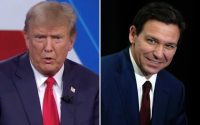Terrorists could be among 1.2 million million US border ‘gotaways
A Border Patrol chief admitted his “tremendous concern” terrorists and spies have infiltrated into the country through the porous US-Mexico border during a Congressional hearing Tuesday morning.
The stunning response was an answer to a question asked during a border security hearing in which two US Border Patrol chiefs assigned to different parts of the international boundary testified.
Republican Congressman Paul Gosar of Arizona asked if terrorists or foreign agents could be among the 1.2 million “gotaways” — people Border Patrol have spotted on camera or by sight but been unable to stop getting into the country — since President Biden took office.
“To speculate who could possibly be in the ‘gotaways’ or the unknowns would just simply be speculation,” said Chief Patrol Agent John Modlin, who heads up the Tucson sector of the agency.

“All I can tell you is that it is a tremendous concern that anyone goes through the border undetected, but the reality is that we know that there are people getting by.”
In the fiscal year 2022, Customs and Border Protection apprehended 98 people whose names appeared on the terror watchlist trying to enter the US illegally. Since the new year started in October 2022, 38 people identified as known terrorists, suspected terrorists, or associates of both were stopped from attempting to cross into the US.
A record-shattering 2.4 million migrants were encountered by federal agents at the border in the fiscal year 2022 — the most ever. The second highest year was 2021 when 1.7 million attempts to cross the southern border were made, according to federal statistics.
“We went from what I would describe as ‘unprecedented’ to a point where I don’t have the correct adjective to describe what’s going on,” Modlin described of the strain on his department.

Rep. Byron Donalds, a Florida Republican, blamed President Biden’s policies for the historic surge and asked immigration officials if they agreed.
“Interviewing [migrants] post-arrest, what became the most common response was that they believed that when the administration changed, the policy changed, and that there was an open border,” stated the Tucson chief.

However, Modlin added that while perception among those coming to the border may have shifted, the law and policies did not. He said immigration agents are not enforcing the law differently than they did under previous administrations.
Like many Congressional hearings, Tuesday’s border hearing featured more political point-scoring than a discussion of how to fix problems. However, one lawmaker did ask the border chiefs what solutions they could offer to help end the border crisis.

Gloria Chavez, the chief of the Rio Grande Valley sector in Texas, said the men and women on the front lines should be helping lawmakers to reform immigration policy.
“Whenever Congress is ready to put that team together, look at Border Patrol agents to come in and advise you,” Chavez stated. “If we don’t have the right policies or consequences, the world is watching us — we’re going to continue to see these large migration flows from around the world entering here at our southern border.”




